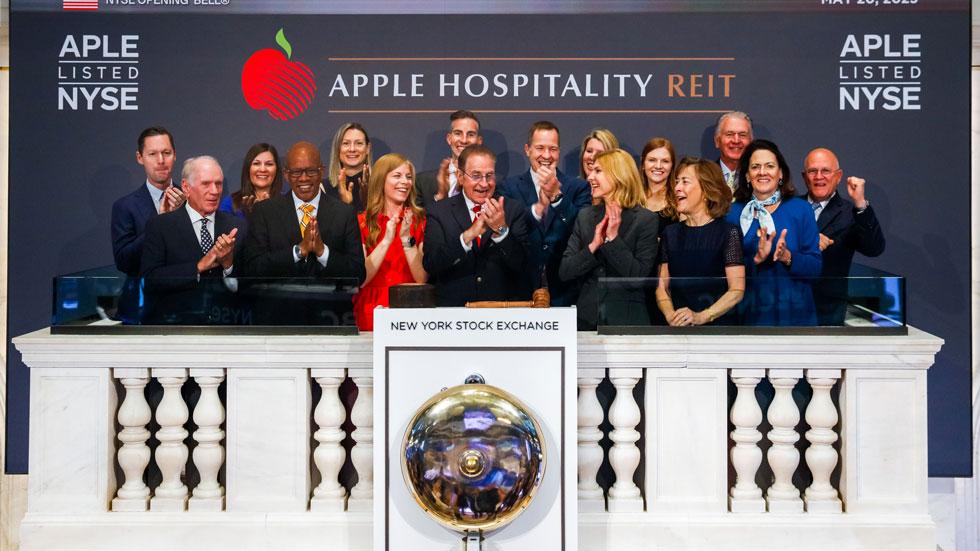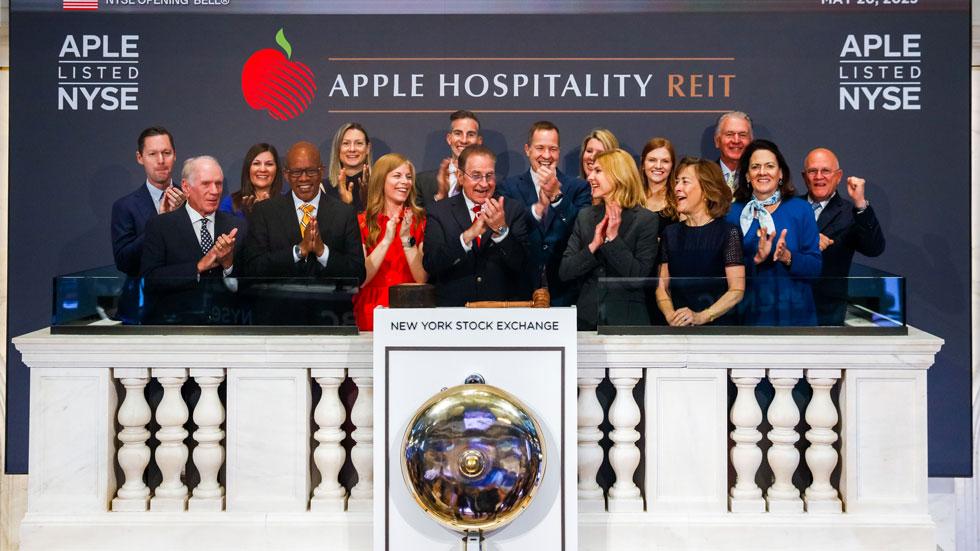
As it celebrates 25 years in the hospitality industry and a decade since listing on the New York Stock Exchange, Apple Hospitality REIT, Inc. (NYSE: APLE) sees its differentiated strategy as central to its success across various economic cycles—and the foundation for enhanced shareholder value in years to come.
That strategy incorporates a focus on upscale, rooms-focused hotels, alignment with the best brands, hiring industry-leading operators, geographic diversification, a strong and flexible balance sheet, and accretive, opportunistic acquisitions and dispositions.
The Richmond, Virginia-based REIT oversees one of the largest and most diverse portfolios of upscale, rooms-focused hotels in the United States. The company’s portfolio includes 221 properties with approximately 29,900 rooms across 85 markets in 37 states and Washington, D.C.
“Listing on the NYSE was a significant milestone for us,” says Justin Knight, CEO of Apple Hospitality. “It put us in a position where our activities were more broadly recognized within the investment community.”

Boasting a strong concentration of industry-renowned brands—97 Marriott, 118 Hilton, five Hyatt and one independent hotel—Apple Hospitality leverages its extensive network to deliver quality accommodations with broad consumer appeal across the country.
“Having a resilient and stable platform has been key,” Knight says. “The chain scales we have selected to invest in, primarily upscale select service, and the brands we have chosen to partner with offer robust loyalty programs and strong name recognition among the diverse consumers we are targeting. In turn, these brands drive a significant number of customers to our hotels.”
Creating Strong Value Proposition
The company today was formed in 2007 under the name Apple REIT Nine, Inc., though through its predecessor companies, the team has enjoyed a history in the lodging industry of 25 years.
“Over that time period, we created eight hotel-focused REITs, four of which we sold to private equity investors in three transactions, and the remaining four we consolidated into what is now our publicly traded company,” Knight says.
From the outset, Apple Hospitality’s mission has remained focused on owning and acquiring hotels that appeal broadly to consumers, diversifying its portfolio across various U.S. markets and key demand drivers, and partnering with leading lodging brands and top hospitality management companies in the industry.
“We began the development of a strategy to invest in the hospitality space with a core objective to provide investors with strong cash yields on their investment, and to provide them with returns that were relatively stable in what is otherwise a fairly volatile industry,” Knight says. “To that end, we developed a strategy that continues to differentiate us, investing in predominantly upscale select service hotels.”
Most importantly, Apple Hospitality’s strategy centers on continuous reinvestment in its properties to maximize value, made possible through disciplined capital allocation and preserving financial flexibility by maintaining low levels of debt.
“Our hotels have roughly equal contributions coming from leisure and business travel,” Knight says. “Maintaining the assets over time and making sure we reinvest in them is a key contributor to maintaining the strong value proposition for our customers.”
Making Moves
Over its history, Apple Hospitality has owned more than 450 hotels and draws on knowledge from its long track record to assess new hotel investments.
“Having bought and sold hotels through multiple economic cycles, we’ve developed a keen instinct that adds to a measured quantitative analysis as we look at potential additions to the portfolio,” Knight says.
“As we look to add hotels, we’re looking to invest in assets and markets that are likely to grow at a pace that exceeds the national average. And we’re looking to fill gaps. We are mindful of how we are building out the portfolio and are making sure we have an appropriate balance in different market types and geographic areas.”
Much of its acquisition activity in recent years has been focused on larger, newly built assets. However, in June, the company acquired the 126-room Homewood Suites by Hilton Tampa-Brandon for $18.8 million.

“Looking at this property, we saw a unique opportunity to acquire a hotel at an attractive going in yield in a market where we own another hotel immediately adjacent to this one and to leverage our presence in the market to further improve our return on investment,” Knight says. “With our experience renovating hotels to meaningfully improve our market positioning and our ability to achieve operational efficiencies by joining management with our adjacent hotel, this was a sound investment for us.”
Apple Hospitality’s ability to navigate the COVID-19 pandemic helped position it to make this type of acquisition.
“We produced relatively strong returns over that period of time and were the first publicly traded hospitality REIT to return to positive cash flow both at the property and corporate level,” he says. “We were very intentional in developing a strategy designed to mitigate volatility in our performance over time, and COVID provided the ultimate test of that strategy, one I feel we did particularly well with.”
By preserving its balance sheet, Apple Hospitality was poised to be acquisitive as the hotel industry recovered from the travel disruption caused by COVID-19. Since the pandemic, the company has invested more than $1 billion in new acquisitions and sold approximately $350 million in assets.
“Our transaction activity has further enhanced and strengthened our portfolio and positioned us well for the environment we are in today,” Knight says. “We’re always wanting to better ourselves -- that’s a piece of our DNA.”
Appeal to Investors
In large part, Apple Hospitality’s experience through industry cycles has reinforced the company’s conviction in its overall strategy, which it continues to refine over time.
For instance, initially, the early companies were invested exclusively in upscale extended stay brands like Residence Inn and Homewood Suites, but over time expanded beyond those brands to include a broader range of upscale select service brands. The company’s focus has remained on rooms-focused hotels, which benefit from an efficient operating model that allows Apple Hospitality to achieve industry leading margins.
Apple Hospitality’s balance sheet is also a meaningful differentiator.
“Having been through multiple cycles now, our concept of investing in hotel assets with very low leverage has been validated in a very significant way,” Knight says. “Our consistency in maintaining the strength of our balance sheet has been a key element in our long-term success.”
Michael Bellisario, managing director and senior research analyst of hotels with Baird Equity Research, notes consistency over the years has been a key attribute for the company and a driver of investor interest as investors trust management with their capital.
“Apple has used the public markets to improve earnings growth as well as the portfolio’s quality over the last 10 years,” he says. “The company has issued equity to fund high-quality, high-growth acquisitions, and the company has sold hotels (with lower-growth profiles and capex needs) and used those proceeds to repurchase stock.”
Additionally, he says remaining focused on the select-service segment—what they know best—has played into their success.

“The company has leveraged its size and scale with brand partners and management companies to better align interests and incentives,” Bellisario says. “Lastly, the balance sheet strategy—low leverage—has been consistent over the years. Maintaining financial and capital allocation flexibility is key for a hotel REIT, especially given the cyclical nature of cash flows and dividend payout requirements.”
When Knight thinks about the growth of the portfolio, he points to the company’s focus on two things—prioritizing the fundamentals of the business that drive earnings per share and being thoughtful capital allocators, ensuring investments are made in a way that further strengthens performance.
“Many investors are initially attracted to us by the strong dividend yield,” he says. “We have a track record of performance having managed a portfolio of hotels through multiple economic cycles. Investors tend to invest with us because they believe in the overarching strategy and have confidence in our ability to consistently produce desired outcomes for them.”
Experienced Management Team
Glade M. Knight is the founder and executive chairman of Apple Hospitality, and father of the current CEO. The rest of the leadership team includes Nelson Knight, president of real estate and investments; K.C. Gallagher, senior vice president and COO; Liz Perkins, senior vice president and CFO; Jeanette Clarke, senior vice president and chief capital investments officer; Rachel Labrecque, senior vice president and chief accounting officer; and Matthew Rash, senior vice president, chief legal officer and secretary.
“We have an exceptional team of highly competent individuals both in our corporate office and in the management companies we work with,” Knight says. “Having those people as resources to help navigate challenges and a team focused on continual improvement has helped us to outperform.”
Looking back over 25 years in the industry, Apple Hospitality is grateful for the relationships it has developed and acknowledges the contribution of many who are not directly employed by the company.
The Future Looks Bright
Following the pandemic, Apple Hospitality has seen a shift in consumer sentiment, where preferences for travel and experiences take precedence over the acquisition of goods, which bodes well for the company and industry.
“We are optimistic about the future of our industry,” Knight says. “We are mindful of the increased use of technology, specifically in the booking process, and have been working with brands to ensure we are optimized to provide guests with the experience that best suits their travel needs.”
The fundamentals of Apple Hospitality’s business remain strong, and the company is spending a lot of time focused on outperforming the industry and providing superior returns for its investors amidst an uncertain macroeconomic outlook.
“It’s a bit of a challenging environment we are operating in today and, partnering with the management companies that run our hotels, we will be focused on maximizing topline performance while managing expenses in a way that preserves margins,” Knight says. “Outside of that, opportunistically, we will be looking to transact in ways that further drive earnings per share. Recently, that’s meant selling hotels and using proceeds to purchase shares in our own company, which we can buy at a meaningful spread compared to what’s available in private markets today.”
As the company continues to navigate the current lodging industry landscape, it will rely on the same principles that have driven Apple Hospitality’s long-term success as it seeks to mitigate the risks of investing in the lodging industry while maximizing operating results no matter the economic climate.


